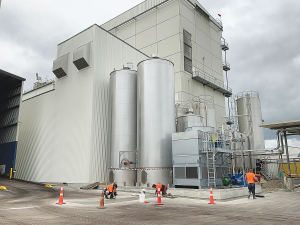Open Country opens butter plant
When American retail giant Cosco came to audit Open Country Dairy’s new butter plant at the Waharoa site and give the green light to supply their American stores, they allowed themselves a week for the exercise.
 A new lactose plant and cheese capacity upgrade at Waharoa means Open Country Dairy needs more milk to fill it.
A new lactose plant and cheese capacity upgrade at Waharoa means Open Country Dairy needs more milk to fill it.
The country's second largest milk processor is on the hunt for more farmer suppliers in Waikato.
Open Country Dairy, which has recently commissioned a new cheese capacity upgrade and lactose plant at its Waharoa facility, needs more milk to fill it.
In a bid to lure suppliers from Fonterra, Open Country is also offering a new milk payment option, similar but superior to the co-op's, for new and existing Waikato suppliers.
It's new 'milk price plus' initiative guarantees farmers 5c/kgMS more than they would have earned on Fonterra's farmgate model and a better advance rate.
The payment system will be similar to what Fonterra offers - monthly advance rate paid to farmers plus a wash-up payment after the end of the season.
Open Country currently also has a high cash flow model that pays its suppliers in full over four installments in a season, which will also be on offer.
Open Country chief executive Steve Koekemoer says the company is putting two payment options before Waikato farmers because some farmers are used to working around traditional farmgate milk price model based on the markets.
"We currently pay our farmers quarterly in full which follows the market pricing and delivers cash back to the farmers quicker. We have always believed that farmers deserve to get their money back faster," he told Dairy News.
"Many farmers are used to operating under the traditional payment system used by other processors.
"So, we are offering both options as a limited time offer to Waikato farmers."
Waikato region is the most competitive region. Synlait, Open Country Dairy and Fonterra operate milk plants and will soon be joined by Olam which plans to commission its new plant at Tokoroa in August. Happy Valley Milk is building a milk plant at Otorohanga but the project has been delayed by a lack of funds.
Dairy prices have jumped in the overnight Global Dairy Trade (GDT) auction, breaking a five-month negative streak.
Alliance Group chief executive Willie Wiese is leaving the company after three years in the role.
A booklet produced in 2025 by the Rotoiti 15 trust, Department of Conservation and Scion – now part of the Bioeconomy Science Institute – aims to help people identify insect pests and diseases.
A Taranaki farmer and livestock agent who illegally swapped NAIT tags from cows infected with a bovine disease in an attempt to sell the cows has been fined $15,000.
Bill and Michelle Burgess had an eye-opening realisation when they produced the same with fewer cows.
It was love that first led Leah Prankerd to dairying. Decades later, it's her passion for the industry keeping her there, supporting, and inspiring farmers across the region.
President Donald Trump’s decision to impose tariffs on imports into the US is doing good things for global trade, according…
Seen a giant cheese roll rolling along Southland’s roads?